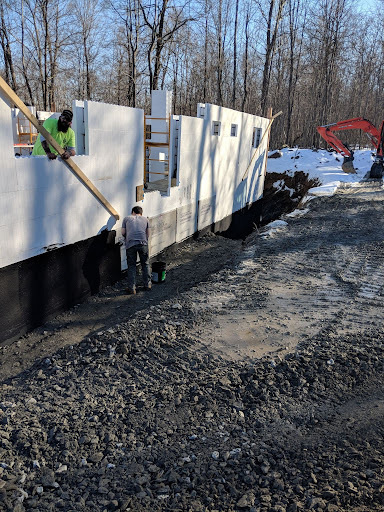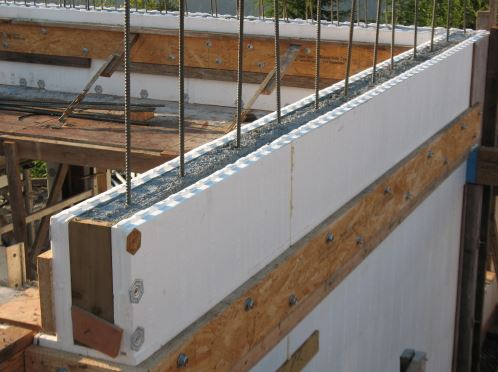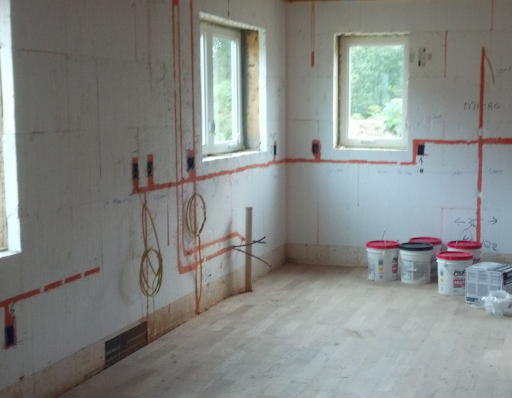
Understanding the Construction Process for an ICF Home Addition

Building a home addition with Fox Blocks ICFs will quickly add much-needed space to your home. An ICF addition will also increase your home’s resale value, improve its energy-efficiency, safety, and durability. ICF construction also avoids budget problems due to escalating and volatile lumber prices.
The Need for ICF Additions
In August 2021, the median home sale price was $360K - up 18 percent from August 2020, significantly challenging future homebuyers. If you can’t afford to buy, but desperately need more room, a home addition is a good solution.
Global Market Insights estimates that people in the United States will spend over 1 trillion dollars on room additions and remodels from 2018 to 2024, providing a significant opportunity for contractors and tradespeople. However, lumber shortages and rising prices continue to challenge contractors to stay on schedule and budget. In response, contractors today must rethink their building methods, particularly when it comes to wood construction.
Fortunately, easy and fast ICF construction adds much-needed space to a home while avoiding the timeline and budget problems associated with lumber.
Why Choose an ICF Addition for Your Home?
ICF additions are a cost-effective, less-labor intensive, and quicker building method than traditional wood construction. ICF additions create durable, energy-efficient, and disaster-resistant spaces, all crucial components for today's homes. As a result, contractors planning to take advantage of the booming home addition market must turn to innovative, alternative building methods, like ICF.
The Benefits of ICF Additions
ICFs are a superior building product for home additions, allowing faster construction and less labor than wood-framing additions. In addition, ICF foundations don’t require concrete foundation contractors or masonry specialists, making them significantly more straightforward to construct than traditional poured concrete foundations. Ultimately, ICFs lessen costs, both during and after construction while speeding up the completion time frame for faster occupancy.

How to Connect ICFs to Your Existing House
An ICF addition needs to interface thoroughly with the existing structure; therefore, a successful addition requires review of the plans by a professional ICF engineer. All connections to existing structures shall be treated as expansion joints with appropriate sealants and flashings. Below grade walls will require waterproofing applications to span over the joints from the existing foundation’s wall to new walls.

Connecting an ICF Addition to an Existing CMU Foundation
Before connecting an ICF wall to a CMU foundation, you must knock holes into the CMU wall, then extend the ICF horizontal rebar into the CMU cavity.
Connecting to an ICF Addition to a Poured Concrete Foundation
Connecting an ICF to a poured concrete foundation requires engineering advice on inserting steel rebar dowels into an existing concrete foundation, which will then be embedded into concrete in ICF walls.
Connecting an ICF Addition to Existing Wood-Framed Walls
Connecting an ICF addition to wood-framed walls requires an engineer to assess the structural connection between the ICF and the existing wood wall. In addition, they must ensure that the interior walls adjacent to the ICF can achieve the needed fire rating. Finally, you must adequately flash the connection to create a continuous envelope system.
Why Choose Fox ICF for Home Additions?
Fox Blocks combine five-building components: insulation, attachment, air barrier, structure, and vapor retarder. The all-in-one wall system minimizes coordination of multiple trades, significantly reducing delivery time while quickly achieving the home addition goals. Fox Blocks may be used either for a full basement foundation, crawl space, frost wall foundation, or foundation plus above grade walls.
Fox Blocks ICF Provides Many Financial Benefits
Energy-efficient, air-tight Fox Blocks ICF additions lessen energy bills and create comfortable, cozy, and healthy spaces. ICFs incorporate continuous insulation (R-value of 23) with few to no thermal bridges, exceeding ASHRAE/ANSI 90.1 energy code requirements.
Disaster-resistant Fox Blocks ICF additions save on replacement and repair costs after a natural disaster. ICF additions can withstand hurricane and tornado winds exceeding 200 mph and projectile debris traveling over 100 mph. Fox Blocks also achieve a fire-resistance rating (ASTM E119) of 4 hours for the 6-inch blocks and 2 hours for the 4-inch blocks.
ICF’s solid continuous monolithic concrete wall additions, with a perm rating below 1.0, controls moisture infiltration from both soil and the home’s occupants, saving homeowners on expensive repairs due to damaging and unhealthy mold.
ICF subcontractors can quickly install plumbing, electrical, and HVAC because of the ease in cutting the foam.
ICFs allow one contractor to build the foundation and above grade exterior walls.
The Best Rooms for an ICF Addition

Any added space to your home will benefit from ICF construction; however, certain rooms may offer a better return on investment (ROI). ICF additions will also improve your home’s energy efficiency, durability, safety, and health.
Building a Multi-Purpose ICF Garage
Adding either an attached or detached multi-purpose ICF garage can serve as an extension to your home, creating space for storage, a workshop, a mother-in-law suite, and more. In addition, building an ICF garage will create an energy-efficient, safe, durable, and comfortable space, protecting your expensive possessions, cars, and occupants from moisture, fire, and wind.
The addition of a detached garage produces an ROI of 100 percent, particularly if it includes a small living space with a kitchen and bath.
ICF Bedroom Addition
When your family expands and you quickly need another bedroom, ICF construction is a fast and straightforward way to get that extra space. Building out and extending your home’s perimeter for a bedroom provides an ROI of about 50 percent.
Designing a Utility Room or Mudroom as an ICF Safe Room
Adding square footage to your house with an ICF utility room, butler’s pantry, or mudroom will add storage, help keep your home organized, and add resale value.
These spaces can also serve as safe rooms or shelters if built according to FEMA guidelines. Fortunately, Fox Blocks ICFs provide a superior product for a FEMA-approved safe room, meeting and exceeding the FEMA safe room design and construction criteria for a continuous load path and impact resistance.
A safe room can increase the resale price by 3.5 percent or a ROI of 84 percent ROI.
An Apartment ICF Addition
Building an apartment addition, whether attached or detached to your home, provides a space for your parents, adult children, or for you to rent. Utilizing ICFs will ensure a low-maintenance and safe apartment with manageable costs. In-law apartments provide a 100 percent ROI.
Should You Build an ICF Home Addition?
Building a home addition with ICFs instead of wood framing will create a more energy-efficient, safer, and healthier living space. You will complete your project in a quicker timeline than wood construction, which is vital if you need more space right away. Finally, ICF construction helps manage building costs since it doesn't depend on expensive lumber or multiple subcontractors.
For more on understanding the construction process for an ICF home addition, contact the professionals at Fox Blocks today.